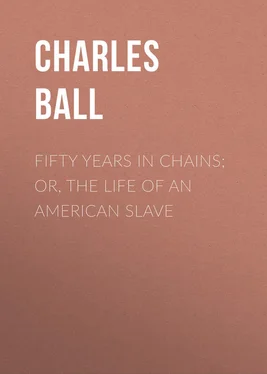Charles Ball - Fifty Years in Chains; or, the Life of an American Slave
Здесь есть возможность читать онлайн «Charles Ball - Fifty Years in Chains; or, the Life of an American Slave» — ознакомительный отрывок электронной книги совершенно бесплатно, а после прочтения отрывка купить полную версию. В некоторых случаях можно слушать аудио, скачать через торрент в формате fb2 и присутствует краткое содержание. Жанр: foreign_antique, foreign_prose, Биографии и Мемуары, на английском языке. Описание произведения, (предисловие) а так же отзывы посетителей доступны на портале библиотеки ЛибКат.
- Название:Fifty Years in Chains; or, the Life of an American Slave
- Автор:
- Жанр:
- Год:неизвестен
- ISBN:нет данных
- Рейтинг книги:4 / 5. Голосов: 1
-
Избранное:Добавить в избранное
- Отзывы:
-
Ваша оценка:
- 80
- 1
- 2
- 3
- 4
- 5
Fifty Years in Chains; or, the Life of an American Slave: краткое содержание, описание и аннотация
Предлагаем к чтению аннотацию, описание, краткое содержание или предисловие (зависит от того, что написал сам автор книги «Fifty Years in Chains; or, the Life of an American Slave»). Если вы не нашли необходимую информацию о книге — напишите в комментариях, мы постараемся отыскать её.
Fifty Years in Chains; or, the Life of an American Slave — читать онлайн ознакомительный отрывок
Ниже представлен текст книги, разбитый по страницам. Система сохранения места последней прочитанной страницы, позволяет с удобством читать онлайн бесплатно книгу «Fifty Years in Chains; or, the Life of an American Slave», без необходимости каждый раз заново искать на чём Вы остановились. Поставьте закладку, и сможете в любой момент перейти на страницу, на которой закончили чтение.
Интервал:
Закладка:
By this time the sun was going down, and I observed two female slaves, a woman and girl, approaching the house on the side of the kitchen from the cotton-field. They were coming home to prepare supper for the family; the ladies whom I had seen in the kitchen not having been there for the purpose of performing the duties appropriate to that station, but having sought it as a place of refuge from the sight of my master, who had approached the front of their dwelling silently, and so suddenly as not to permit them to gain the foot of the stairway in the large front room, without being seen by him, to whose view they by no means wished to expose themselves before they had visited their toilets. About dark the supper was ready in the large room, and, as it had two fronts, one of which looked into the yard where my companions and I had been permitted to seat ourselves, and had an opportunity of seeing, by the light of the candle, all that was done within, and of hearing all that was said. The ladies, four in number, had entered the room before the gentlemen; and when the latter came in my master was introduced, by the landlord to his wife and daughters, by the name and title of Colonel M'Giffin , which, at that time, impressed me with a belief that he was really an officer, and that he had disclosed this circumstance without my knowledge; but I afterwards perceived that in the south it is deemed respectful to address a stranger by the title of Colonel, or Major, or General, if his appearance will warrant the association of so high a rank with his name. My master had declared his intention of becoming the inmate of this family for some time, and no pains seemed to be spared on their part to impress upon his mind the high opinion that they entertained of the dignity of the owner of fifty slaves; the possession of so large a number of human creatures being, in Carolina, a certificate of character, which entitles its bearer to enter whatever society he may choose to select, with out any thing more being known of his birth, his life or reputation. The man who owns fifty servants must needs be a gentleman amongst the higher ranks, and the owner of half a hundred niggers is a sort of nobleman amongst the low, the ignorant, and the vulgar. The mother and three daughters, whose appearance, when I saw them in the kitchen, would have warranted the conclusion that they had just risen from bed without having time to adjust their dress, were now gaily, if not neatly attired; and the two female slaves, who had come from the field at sundown to cook the supper, now waited at the table. The landlord talked much of his crops, his plantation and slaves, and of the distinguished families who exchanged visits with his own; but my master took very little part in the conversation of the evening, and appeared disposed to maintain the air of mystery which had hitherto invested his character.
After it was quite dark, the slaves came in from the cotton-field, and taking little notice of us, went into the kitchen, and each taking thence a pint of corn, proceeded to a little mill, which was nailed to a post in the yard, and there commenced the operation of grinding meal for their suppers, which were afterwards to be prepared by baking the meal into cakes at the fire. The woman who was the mother of the three small children, was permitted to grind her allowance of corn first, and after her came the old man, and the others in succession. After the corn was converted into meal, each one kneaded it up with cold water into a thick dough, and raking away the ashes from a small space on the kitchen hearth, placed the dough, rolled up in green leaves, in the hollow, and covering it with hot embers, left it to be baked into bread, which was done in about half an hour. These loaves constituted the only supper of the slaves belonging to this family for I observed that the two women who had waited at the table, after the supper of the white people was disposed of, also came with their corn to the mill on the post and ground their allowance like the others. They had not been permitted to taste even the fragments of the meal that they had cooked for their masters and mistresses. It was eleven o'clock before these people had finished their supper of cakes, and several of them, especially the younger of the two lads, were so overpowered with toil and sleep, that they had to be roused from their slumbers when their cakes were done, to devour them.
We had for our supper to-night, a pint of boiled rice to each person, and a small quantity of stale and very rancid butter, from the bottom of an old keg, or firkin, which contained about two pounds, the remnant of that which once filled it. We boiled the rice ourselves, in a large iron kettle; and, as our master now informed us that we were to remain here some time, many of us determined to avail ourselves of this season of respite from our toils, to wash our clothes, and free our persons from the vermin which had appeared amongst our party several weeks before, and now begun to be extremely tormenting. As we were not allowed any soap, we were obliged to resort to the use of a very fine and unctuous kind of clay, resembling fullers' earth, but of a yellow color, which was found on the margin of a small swamp near the house. This was the first time that I had ever heard of clay being used for the purpose of washing clothes; but I often availed myself of this resource afterwards, whilst I was a slave in the south. We wet our clothes, then rubbed this clay all over the garments, and by scouring it out in warm water with our hands, the cloth, whether of woollen, or cotton, or linen texture, was entirely clean. We subjected our persons to the same process, and in this way freed our camp from the host of enemies that had been generated in the course of our journey.
This washing consumed the whole of the first day of our residence on the plantation of Mr. Hulig. We all lay the first night in a shed, or summer kitchen, standing behind the house, and a few yards from it a place in which the slaves of the plantation washed their clothes, and passed their Sundays in warm weather, when they did not work; but as this place was quite too small to accommodate our party, or indeed to contain us, without crowding us together in such a manner as to endanger our health, we were removed, the morning after our arrival, to an old decayed frame building, about one hundred yards from the house, which had been erected, as I learned, for a cotton-gin, but into which its possessor, for want of means I presume, had never introduced the machinery of the gin. This building was near forty feet square; was without any other floor than the earth, and neither doors nor windows, to close the openings which had been left for the admission of those who entered it. We were told that in this place the cotton of the plantation was deposited in the picking season, as it was brought from the field, until it could be removed to a neighboring plantation, where there was a gin to divest it of its seeds.
Here we took our temporary abode – men and women, promiscuously. Our provisions, whilst we remained here, were regularly distributed to us; and our daily allowance to each person, consisted of a pint of corn, a pint of rice, and about three or four pounds of butter, such as we had received on the night of our arrival, divided amongst us, in small pieces from the point of a table knife. The rice we boiled in the iron kettle – we ground our corn at the little mill on the post in the kitchen, and converted the meal into bread, in the manner we had been accustomed to at home – sometimes on the hearth, and sometimes before the fire on a hoe. The butter was given us as an extraordinary ration, to strengthen and recruit us after our long march, and give us a healthy and expert appearance at the time of our future sale.
We had no beds of any kind to sleep on, but each one was provided with a blanket, which had been the companion of our travels. We were left entirely at liberty to go out or in when we pleased, and no watch was kept over us either by night or day.
Читать дальшеИнтервал:
Закладка:
Похожие книги на «Fifty Years in Chains; or, the Life of an American Slave»
Представляем Вашему вниманию похожие книги на «Fifty Years in Chains; or, the Life of an American Slave» списком для выбора. Мы отобрали схожую по названию и смыслу литературу в надежде предоставить читателям больше вариантов отыскать новые, интересные, ещё непрочитанные произведения.
Обсуждение, отзывы о книге «Fifty Years in Chains; or, the Life of an American Slave» и просто собственные мнения читателей. Оставьте ваши комментарии, напишите, что Вы думаете о произведении, его смысле или главных героях. Укажите что конкретно понравилось, а что нет, и почему Вы так считаете.












